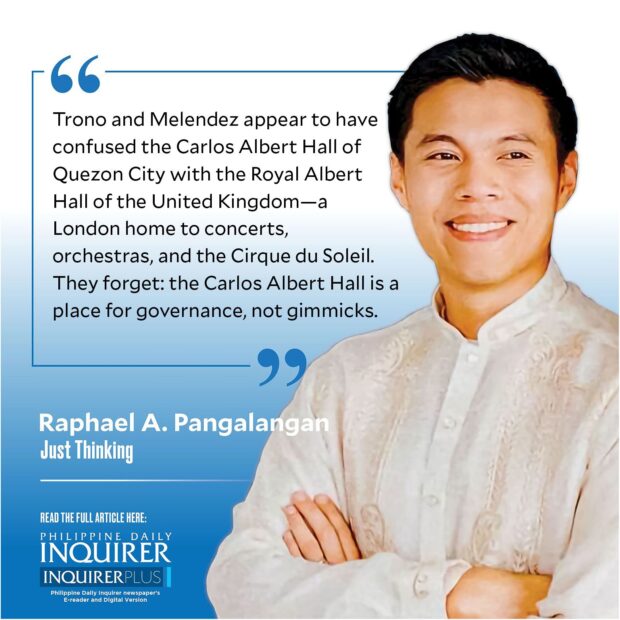Public service, not public spectacle
Gone are the days that jingles and jolts were reserved for election season. Today, even sitting politicians are in on the song and dance.
To quote Maximus Meridius: “Are you not entertained?”
Cue in Quezon City councilor Aiko Melendez and Sangguniang Kabataan chair Julian Trono who, in the most recent episode of celebrity politics, have come under public scrutiny. Before joining public office, the duo first entered the public eye as entertainers. But, in light of the viral video, it appears these two roles may not be so different. Melendez’s recent viral video shows the duo, front and center of the Carlos Albert Hall — home to the Sangguniang Panlungsod’s official business — engage in a viral TikTok dance. Behind them, the Philippine flag proudly drapes from above, yet now, no longer to the tune of the Philippine national anthem but to the hymn of karaoke bars. Accompanying their dance was Mariah Carey’s “Touch My Body.”
Trono and Melendez appear to have confused the Carlos Albert Hall of Quezon City with the Royal Albert Hall of the United Kingdom — a London home to concerts, orchestras, and the Cirque du Soleil. They forget: The Carlos Albert Hall is a place for governance, not gimmicks.
The celebrification of politics is nothing new to our country. Our records are rich with examples, from former president Joseph “Erap’’ Estrada to incumbent senators Ramon “Bong” Revilla and Robinhood Padilla. A history of actors turned politicians, or so they’d argue.
The fusion of celebrity and politics is no stranger to the Philippines. But Melendez and Trono’s video raises a new question: Are they actors first and politicians second, or politicians first and actors second? In light of recent events, it seems neither is true. These aren’t actor-politicians. They’re actors pretending to be politicians, seeing public office as another stage, and governance as another script.
But what is perhaps even more disconcerting than the dance itself is its defense. Melendez claims: No roll call was made. The dance was “before session.” No rule was thus violated! Well, to this, I don my professorial cap and say: Class is in session, though Albert Hall wasn’t. Melendez’s defense echoes the faults of Philippine formalism. Forget the rules of ethics, norms, and traditions, they say. Never mind dharma. Melendez’s formalism demands doctrine.
Ironically enough, however, Melendez’s defense isn’t only normatively flat. It is simply untrue. Rules do exist that would exclude noontime gimmicks from Albert’s hallowed halls. Section 4 of Republic Act No. 6713, for example, identifies as a norms of conduct of public officials and employees the standard of professionalism. It reads: “Public officials and employees shall perform and discharge their duties with the highest degree of excellence, professionalism, intelligence, and skill. They shall enter public service with utmost devotion and dedication to duty.”
Even the Sangguniang Panlungsod’s own guidelines states that “proper decorum shall be strictly observed inside the Session Hall.” If applause, claps, and boos are prohibits from these halls, surely Mariah Carey tunes would be too.
Yet, as far as this textual loyalist is concerned, for a rule to stand, it must be written. This is thus much more than fiscal economy. Melendez reveals her legal theory.
Yet, for Melendez and those who share her view, a rule is only valid if written. But what this incident reveals is more than a loose interpretation of rules. It unmasks a flawed legal theory, one that believes moral codes and standards of propriety only exist when they’re inked. Where moral standards and propriety, to count, must be codified.
Melendez and Trono’s “performance” underscores the need for a shift in perspective. Rather than being enslaved to the literal text, public servants should embody a higher code of conduct, a dharma of governance that transcends doctrine. After all, public service is not a stage; it is a solemn duty to the people. Our leaders must remember: Their role is not in public spectacle, but public service.





















